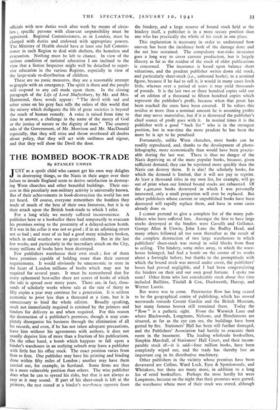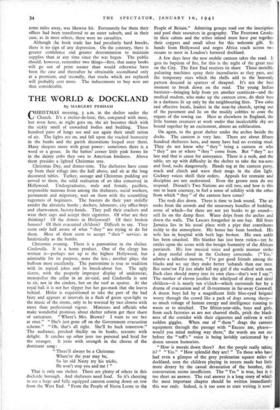THE BOMBED BOOK-TRADE
By STANLEY UNWIN
JUST as a spoilt child who cannot get his own way delights in destroying things, so the Nazis in their anger over their failure to invade England seem to derive satisfaction in destroy- ing Wren churches and other beautiful buildings. Their suc- cess in this peculiarly non-military activity is universally known. But of their achievements in book-destruction the world has not yet heard. Of course, everyone remembers the bonfires they made of much of the best of their own literature, but it is to their attack upon the British book-trade to which I refer.
For a long while we merely suffered inconvenience. A publisher here or a bookseller there had temporarily to evacuate his premises owing to the proximity of a delayed-action bomb. If it was in his cellar it was not so good ; if in an adjoining street not so bad ; and most of us had a good many windows broken, which in mild weather was no great calamity. But in the last few weeks, and particularly in the incendiary attack.on the City, many millions of books have been destroyed.
Few publishers warehouse their own stock ; few of them have premises capable of holding more than their current requirements. It would obviously be uneconomic to store in the heart of London millions of books which may not be required for several years. It must be remembered that for every ephemeral best-seller there are scores of books of which the sale is spread over many years. There are, in fact, thou- sands of scholarly works whose sale at the rate of thirty to fifty copies a year may continue for a generation. It is seldom economic to print less than a thousand at a time, but it is unnecessary to bind the whole edition. Broadly speaking, stock not immediately required is retained by the printers and binders for delivery as and when required. For this reason the destruction of a publisher's premises, though it may com- pletely disorganise his business through the elimination of all his records, and even, if he has not taken adequate precautions, leave him without his agreements with authors, it does not usually deprive him of more than a fraction of his publications. On the other hand, a bomb which happens to fall upon a binder's warehouse in an outlying suburb may leave a publisher with little but his office stock. The exact position varies from firm to firm. One publisher may have his printing and binding done within fifty miles of London ; another may have them carried out, for example, in Scotland. Some firms are thus in a more vulnerable position than others. The wise publisher does what he can to spread his risks, but that is not always as easy as it may sound. If part of his sheet-stock is left at the printers, the rest stored at a binder's warehouse separate from the bindery, and a large reserve of bound stock held at the bindery itself, a publisher is in a more secure position than one who has practically the whole of his stock in one place.
This explanation is necessary in order to understand how uneven has been the incidence both of the damage done and the net loss sustained. The compulsory war-risks insurance goes a long way to cover current production, but is largely illusory as far as the residue of the stock of older publications is concerned. The insurance is based upon balance sheet valuations, and the prudent publisher writes down old stock, and particularly sheet-stock (i.e., unbound books), to a nominal figure, because if he had to sell it, it would in many cases fetch little, whereas over a period of years it may yield thousands of pounds. It is the last two or three hundred copies sold out of an edition of a thousand to fifteen hundred copies which represent the publisher's profit, because when that point has been reached the costs have been covered. If he values this residue at more than a nominal amount he is assuming profits that may never materialise, but if it is destroyed the publisher's chief source of profit goes with it. In normal times it is the publisher with a good " back list " who is in the strongest position, but in war-time the more prudent he has been the more he is apt to be penalised.
Fortunately, unlike Wren churches, most books can be readily reproduced, and, thanks to the development of photo- lithography, more economically than would have been practic- able during the last war. There is thus no danger of the Nazis depriving us of the more popular books, because, given sufficient demand, they can be reprinted more quickly than the Nazis can destroy them. It is alas! the scholarly books, for which the demand is limited, that it will not pay to reprint. At least a thousand titles in my own list, for example, will go out of print when our limited bound stocks are exhausted. Of the 1,400,000 books destroyed in which I was personally interested, only a small proportion will ever be replaced. But other publishers whose current or unpublished books have been destroyed will rapidly replace them, and have in some cases already done so.
I cannot pretend to give a complete list of the many pub- lishers who have suffered loss. Amongst the first to have large stocks destroyed at the binders were Cassells and Gollancz. George Allen & Unwin, John Lane the Bodley Head, and many others followed all too soon thereafter as the result of the complete destruction of two large warehouses in which publishers' sheet-stock was stored in solid blocks from floor to ceiling. The bindery, some miles away, to which the ware- house belonged, had had a bomb on the corner of its works about a fortnight before, but thanks to the promptitude with which the bound stock was moved under cover, the publishers' losses had proved negligible, and I had been congratulating the binders on their and our own good fortune. I spoke too soon! Other firms who lost considerable stock about that time included Bailliere, Tindall & Cox, Duckworth, Harrap, and Werner Laurie.
But worse was to come. Paternoster Row has long ceased to be the geographical centre of publishing, which has moved westwards towards Covent Garden and the British Museum, but many famous houses still remained there. Today the " Row " is a pathetic sight. From the Warwick Lane end where Blackwoods, Longmans, Nelsons, and Hutchinsons are situated, as far as the eye can see, the buildings have been gutted by fire. Stationers' Hall has been still further damaged, and the Publishers' Association had hastily to evacuate their room in the basement. The leading wholesale booksellers, Simpkin Marshall, of Stationers' Hall Court, and their incom- parable stock of—it is said—four million books, have been completely wiped out, and the trade has thereby lost an important cog in its distributive machinery.
Other publishers in the vicinity whose premises have been devastated are Collins, Ward Lock, Eyre & Spottiswoode, and Whitakers, but there are many more, in addition to a long list of retail booksellers. Perhaps the most hardly hit were Longmans, because on the night that their premises were gutted, the warehouse where most of their stock was stored, although some miles away, was likewise hit. Fortunately for them their offices had been transferred to an outer suburb, and in their case, as in most others, there were no casualties.
Although the book trade has had peculiarly hard knocks, there is no sign of any depression. On the contrary, there is greater confidence and greater determination to maintain supplies than at any time since the war began. The public should, however, remember two things—first, that many books will go out of print sooner than would otherwise have been the case and thereafter be obtainable secondhand only at a premium, and secondly, that stocks which are replaced will probably cost more. The inducements to buy now are thus considerable.



























 Previous page
Previous page